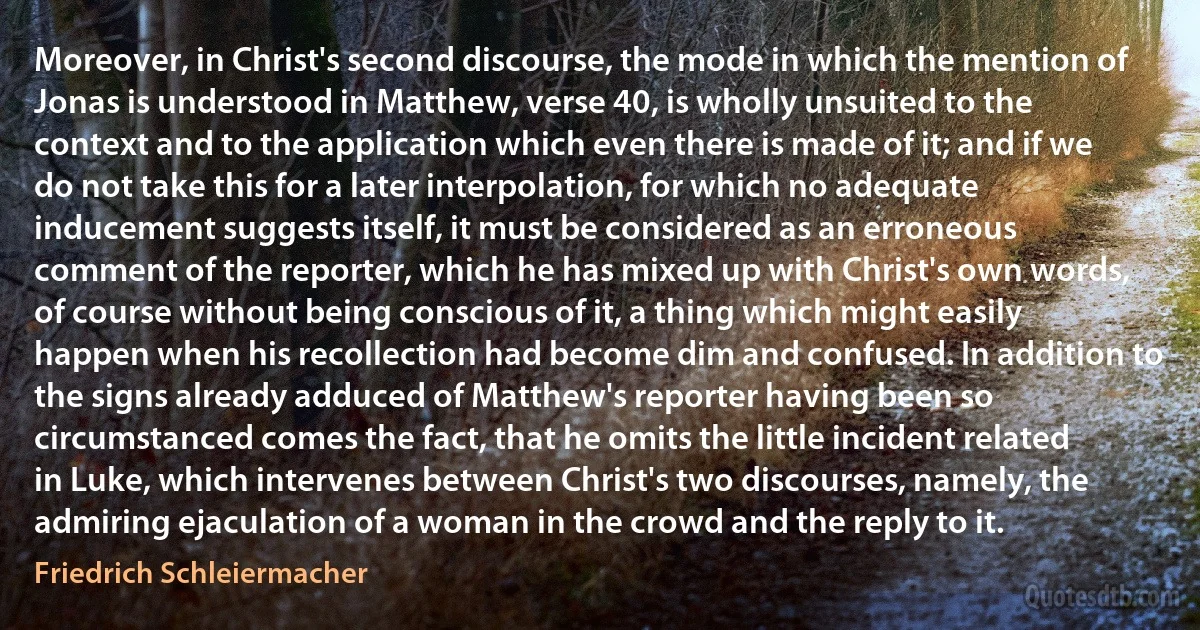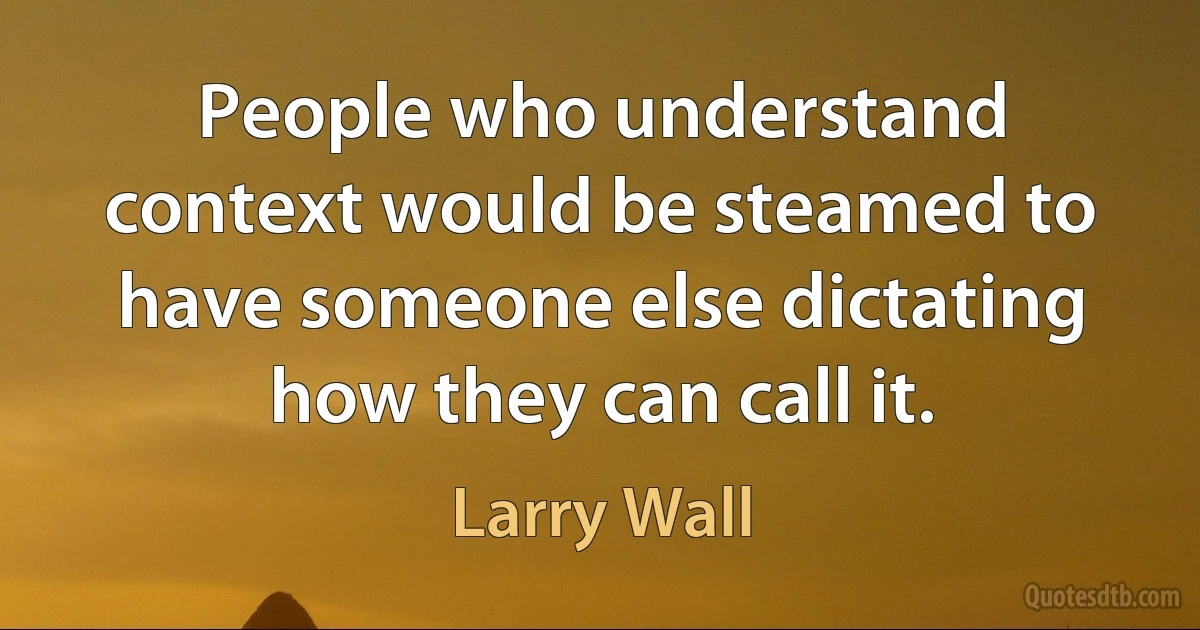Context Quotes - page 11
A modern theory of knowledge which takes account of the relational as distinct from the merely relative character of all historical knowledge must start with the assumption that there are spheres of thought in which it is impossible to conceive of absolute truth existing independently of the values and position of the subject and unrelated to the social context.

Karl Mannheim
The inevitable lack of objectivity in political decisions, which is only the reflex to suppress the politically inherent friend-enemy antithesis, manifests itself in the regrettable forms and aspects of the scramble for office and the politics of patronage. The demand for depoliticalization which arises in this context means only the rejection of party politics, etc. The equation politics = party politics is possible whenever antagonisms among domestic political parties succeed in weakening the all-embracing political unit, the state.

Carl Schmitt
The ideas survived and they can now be said to be in agreement with reason. They survived because prejudice, passion, conceit, errors, sheer pigheadedness, in short because all the elements that characterize the context of discovery, opposed the dictates of reason and because these irrational elements were permitted to have their way. To express it differently: Copernicanism and other "rational" views exist today only because reason was overruled at some time in their past. (The opposite is also true: witchcraft and other "irrational" views had ceased to be influential only because reason was overruled at some time in their past.)

Paul Karl Feyerabend
The lust for power, which of all human vices was found in its most concentrated form in the Roman people as a whole, first established its victory in a few powerful individuals, and then crushed the rest of an exhausted country beneath the yoke of slavery.For when can that lust for power in arrogant hearts come to rest until, after passing from one office to another, it arrives at sovereignty? Now there would be no occasion for this continuous progress if ambition were not all-powerful; and the essential context for ambition is a people corrupted by greed and sensuality.

Augustine of Hippo
Now, we can say to a certain extent that persons in this situation are persons who have really never grown up. They are still children, at a point. For you see, a child is inevitably, necessarily egocentric. He is a bundle of his own sensations, clamoring to be cared for. And, to be sure, he has his own social context. He belongs to his mother, but he cares for her only because he wants to be fed and protected. He does not care for his mother for her sake but he cares for his mother for his own sake. And so a child is inevitably egocentric, inevitably self-centered. And that is why Dr. Burnham says that during the first six or seven years of development, the ego is dominant within the child. And both in behavior and in attitudes, a child is a victim of self-centeredness. This is a part of the early development of a little child. When people become mature, they are to rise above this.

Martin Luther King Jr.
The ideas set forth by organismic biologists during the first half of the twentieth century helped to give birth to a new way of thinking - "systems thinking" - in terms of connectedness, relationships, context. According to the systems view, the essential properties of an organism, or living system, are properties of the whole, which none of the parts have. They arise from the interactions and relationships among the parts. These properties are destroyed when the system is dissected, either physically or theoretically, into isolated elements. Although we can discern individual parts in any system, these parts are not isolated, and the nature of the whole is always different from the mere sum of its parts. The systems view of life is illustrated beautifully and abundantly in the writings of Paul Weiss, who brought systems concepts to the life sciences from his earlier studies of engineering and spent his whole life exploring and advocating a full organismic conception of biology.

Fritjof Capra
Naturally moving water augments itself. It improves its quality and matures considerably. Its boiling and freezing points change, and wise Nature makes use of this phenomenon to raise water, without using pumping equipment, to the highest mountain peaks, to appear as mountain springs. This conception of raising water is not to be taken literally, since in this context it is concerned with the natural process of propagation and purification. This in turn helps towards the expansion of air by creating an air cover, which serves to develop a higher form of life.

Viktor Schauberger
Whenever we write an axiom, a critic can say that the axiom is true only in a certain context. With a little ingenuity the critic can usually devise a more general context in which the precise form of the axiom doesn't hold. [...] There simply isn't a most general context.

John McCarthy (computer scientist)
[ Fuzzy logic is ] a logic whose distinguishing features are (i) fuzzy truth-values expressed in linguistic terms, e. g., true, very true, more or less true, or somewhat true, false, nor very true and not very false, etc2.; (2) imprecise truth tables; and (3) rules of inference whose validity is relative to a context rather than exact.

Lotfi A. Zadeh
"A frequent source of misunderstanding has to do with the interpretation of fuzzy logic. The problem is that the term fuzzy logic has two different meanings. More specifically, in a narrow sense, fuzzy logic, FLn, is a logical system which may be viewed as an extension and generalization of classical multivalued logics. But in a wider sense, fuzzy logic, FLw is almost synonymous with the theory of fuzzy sets. In this context, what is important to recognize is that: (a) FLw is much broader than FLn and subsumes FLn as one of its branches; (b) the agenda of FLn is very different from the agendas of classical multivalued logics; and (c) at this juncture, the term fuzzy logic is usually used in its wide rather than narrow sense, effectively equating fuzzy logic with FLw.

Lotfi A. Zadeh
A fuzzy set is a class of objects with a continuum of grades of membership. Such a set is characterized by a membership (characteristic) function which assigns to each object a grade of membership ranging between zero and one. The notions of inclusion, union, intersection, complement, relation, convexity, etc., are extended to such sets, and various properties of these notions in the context of fuzzy sets are established. In particular, a separation theorem for convex fuzzy sets is proved without requiring that the fuzzy sets be disjoint.

Lotfi A. Zadeh
The more we devote ourselves to observing animals and their behaviour, the more we love them, on seeing how gready they care for their young; in such a context, we cannot even contemplate cruelty to a wolf. Leibnitz put the grub he had been observing back on the tree with its leaf, lest he should be guilty of doing any harm to it. It upsets a man to destroy such a creature for no reason, and this tenderness is subsequendy transferred to man.

Immanuel Kant
I did very little against two lefties, Mike Caldwell and Scott McGregor, for a few years anyway. Eventually, I caught up with both of them, though. It was really Jim Palmer who stands out in this context; I had some success against him overall, but he was so good in clutch situations that I never really hurt him when the game was on the line.

Reggie Jackson
Early scientific thinking was holistic, but speculative -- the modern scientific temper reacted by being empirical, but atomistic. Neither is free from error, the former because it replaces factual inquiry with faith and insight, and the latter because it sacrifices coherence at the altar of facticity. We witness today another shift in ways of thinking: the shift toward rigorous but holistic theories. This means thinking in terms of facts and events in the context of wholes, forming integrated sets with their own properties and relationships.

Ervin László
Stories about mental aberration and oddity only make sense in context. Just how do people live with someone who is peculiar, gifted, strange or alien? It's odd because there's a little part of me that wants to write about exotic, strange bizarre subjects. Instead, I've rather reluctantly realised that what I write about is families.

Mark Haddon
Being disconnected from the local church, for whatever reason, is a dangerous way to live. Not only do these " lone rangers” miss out on the blessings of functioning within the context of the body of Christ, but like lone sheep away from the safety of the flock and the watchful care of the shepherd, they are vulnerable to predators of every sort.

Nancy Leigh DeMoss



